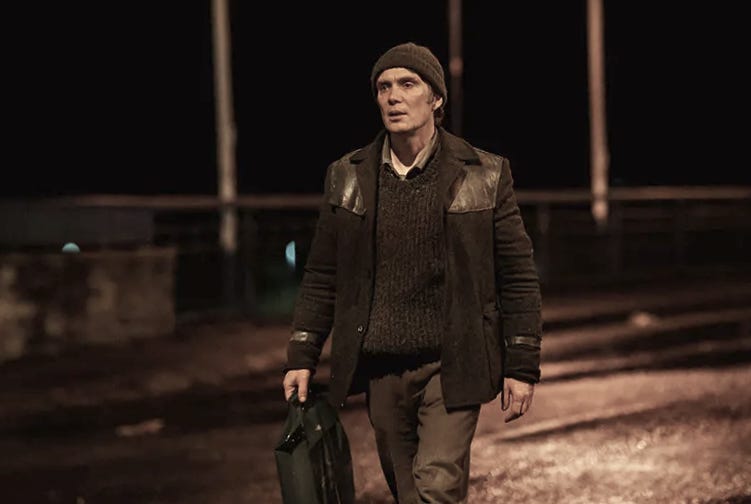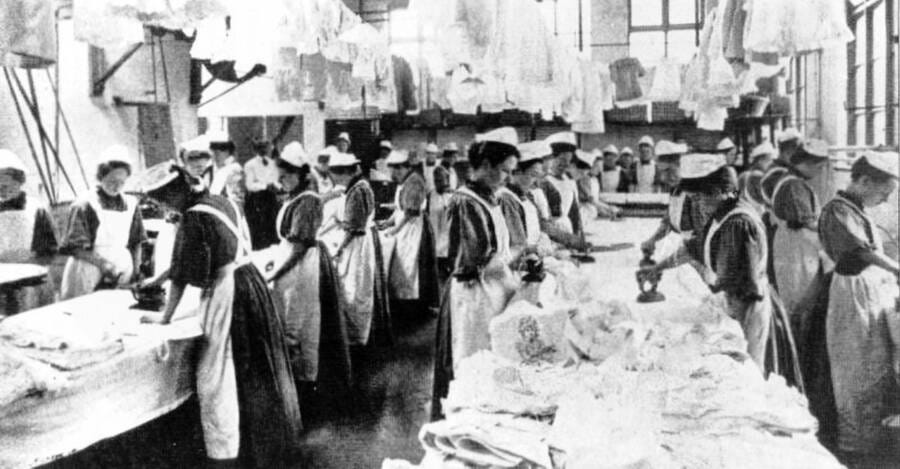The Magdalene Laundries
The horrors in Ireland now tackled by a new streaming series, an upcoming movie drama starring Cillian Murphy, plus songs by Sinead O'Connor and Joni Mitchell.
Greg Mitchell is the author of more than a dozen books and now writer/director of three award-winning films aired via PBS, including “Atomic Cover-up” and “Memorial Day Massacre” which are still up at PBS.org. Before all that, he was a longtime editor of the legendary Crawdaddy. You can still subscribe to this newsletter for free.
You may have heard about Ireland’s “the Magadalene Laundries” many years ago, or just recently, or never. The subject has drifted in and out of my own consciousness over the years but sparked again by a new series streaming on Showtime, a murder mystery that revolves around this long-standing tragedy. It’s called “The Woman in the Wall,” and it stars the always fierce Ruth Wilson, with the first episode airing over the weekend. Reviews have been generally very favorable (especially re: Wilson). The co-star is a fine actor who seems to be in nearly everything we’ve watched across the pond from the UK lately, Daryl McCormack. Trailer here:
We are told that the series closes with an unreleased song from Sinead O’Connor, titled “The Magdalene Song.” It’s not up at YouTube as yet, probably being saved for the posthumous album in the works, but here is a full Guardian story.
See way down below for a brief history of horrors, but here’s just one angle:
Shockingly, the Magdalene laundries operated well into the 1990s – and the last one closed in 1996.
It’s estimated that up to 300,000 “fallen” women passed through Ireland’s Magdalene Laundries between 1765 and 1996. Records show that at least 10,000 girls and women were sent to the laundries between 1922 and 1996. But the true number is likely much higher, as many laundries kept inaccurate records and neglected to report when girls died.
Babies born in the asylums were often taken from their mothers and given to other families. But in some homes, babies faced a much worse fate. At the St. Mary’s Mother and Baby Home in Tuam, the remains of close to 800 babies were found in a septic tank in 1975.
Of course, Joni Mitchell wrote a classic song, “The Magdalene Laundries,” and in the clip below she introduces it in a personal fashion.
One of our favorite films last year was “The Quiet Girl,” from the Claire Keegan novel. She has written another, “Small Things Like These,” very related to this subject, now being made into a movie with Cillian Murphy. The novel is great. There’s a review of it here along with a couple of other books on this subject. (By the way, James Joyce mentions the Laundries in both “The Dubliners” and “Ulysses.”) And here’s the first photo of Cillian Murphy from the movie shoot:
I am reminded that there have been at least two previous movie dramas focusing on this subject that we watched years ago. One was “The Magdalene Sisters” from 2006 and the other the much-praised “Philomena,” starring Judy Dench and Steve Coogan. Highly recommended. Trailer for that here:
Now, more background, cobbled together from various sources:
In 1993, after Dublin convent sold a parcel of land, developers began digging, and they uncovered a decades-old scandal. Under the Irish soil lay a mass grave that, according to Irish Central, contained 155 bodies. Most had no death certificate. An investigation revealed that the grave interred women who’d been sent to the Magdalene laundries.
These “asylums,” meant to reform women, instead abused them. Over the course of more than 230 years, girls living in the laundries were forced to work for no pay and to live in terrible conditions with no schooling.
The Magdalene laundry system dated back to the mid-18th century. Ireland’s first asylum opened in Dublin in 1765 with the intent to prevent prostitution. The asylum sheltered unwed mothers and women who had premarital sex, hoping to prevent their slide into sex work. Some parents sent their daughters to these asylums to hide out-of-wedlock pregnancies.
During this earlier period, women stayed in the asylums for a short time. They learned a skilled trade to support themselves after their release. And many entered the asylums by choice.
But the Magdalene asylums eventually became long-term prisons for women rejected by society. By the time the Republic of Ireland declared independence in 1922, the laundries had become a for-profit system run by four religious groups: the Sisters of Mercy, the Sisters of Charity, the Good Shepherd Sisters, and the Sisters of Our Lady of Charity.
Ireland’s Magdalene laundries promised to reform “fallen” women. But who was sent to the asylums?
The nuns who ran the asylums took in “promiscuous” women. That category included unwed mothers – and their children. The people incarcerated in the convents also included victims of sexual abuse, women who were deemed too flirtatious, women with disabilities, orphans, and impoverished children.
While the Magdalene laundries were almost entirely run by Catholic nuns, the Irish government helped pay for them in exchange for laundry services. And the government also sent women to the asylums, including patients in mental hospitals and wards of the state.
In the laundry system, Catholic nuns vowed to reform their charges through harsh methods. Suffering was penance for sin, the nuns of the Magdalene laundries preached. So the girls were forced to work long hours for no pay.
Local businesses, public hospitals, and government agencies dropped off their laundry at the convents. The girls washed and ironed the clothes. If they refused to work, the nuns withheld food or physically abused the girls.
As reported by RTÉ, an investigation into the home suggested that poor treatment of illegitmate children born there had “signifantly reduced” their chances of survival.




I first heard stories about the ML in the early 70's living in Amsterdam. I had a number of Irish expat friends and this is one of the horrors they told about the church in Ireland. I was already intensely anti from my early Catholic school days and it just cemented my slide into heathenisms.
Thanks for this. I've seen Philomena, which is excellent. Looking forward to Cillian Murphy being reuinted with Enda Walsh, who started his career with Disco Pigs. I have recently watched a few documentaries about the Magdalene Laundries and discovered another insitution of abuse along the way - The Industrial Schools. These were for poor and deprived/illegitimate children but were practically slave camps where very little real education took place. So they punished the children as well as the adult women - at least the ones they couldn't make money from selling for adoption. Usually like Ruth Wilson but found that particular series a bit melodramatic and perhaps exploitative in places.